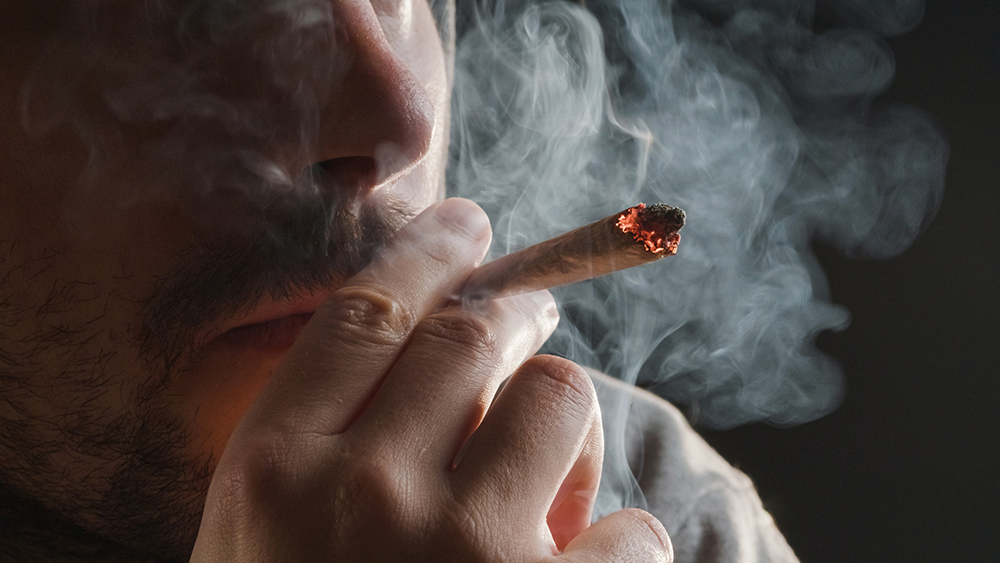
Mash’s older brother was the same age as Anthony Williams when he slaughtered a stranger in a brutal and random attack. He was in the grip of a psychotic disorder caused by cannabis.
We do not yet know what drove Williams, a 32-year-old African Caribbean man, to allegedly try to murder ten people during a 14-minute knife rampage on a train. But Mash is in no doubt cannabis often plays a part in attacks like these. ‘In my community smoking weed is normalised,’ he says. ‘We laugh and joke about hearing voices or having a “para” [a paranoid fit].’ He counts on his fingers: ‘Two brothers, two cousins and multiple friends’ who have experienced hallucinations and delusions. He shakes his head sadly. ‘Weed is killing my people.’
Mental health issues caused by cannabis in the African Caribbean community go largely unreported – until the worst happens. I first realised its dangers when I befriended four members of a gang, aged 15 and 16, in West Norwood. They passed their days smoking weed, selling drugs, appearing at the local magistrates’ court or visiting friends in the Maudsley, the psychiatric hospital in south London. They discussed one young inmate: ‘He’s dumb sudden in the head and he moves a bit slow like.’
Mash recalled the episode that turned the brother he worshipped into a terrifying stranger. It was a family party. His father was saying goodbye to a friend in a car, the window wound down. Without warning, Mash’s brother ran out, thrust his arm through the window, grabbed the man by the throat and started to throttle him. ‘It took three grown men to pull him off. He had that demonic energy.’
The liberal narrative that smoking cannabis is harmless is based on weed use decades ago. The average strength of cannabis has tripled in the past 20 years. The strain known as skunk – named for its pungent odour – is typically grown indoors, treated with chemicals and bred for an exceptionally high THC content.
‘When you start smoking with your mates at 14 or 15, you are literally growing your brain in a cannabis soup,’ says Dr Lade Smith, president of the Royal College of Psychiatrists. ‘There’s no doubt at all. Cannabis is a cause of psychosis.’ A study published in JAMA Psychiatry found that south-east London has the highest rates of first-episode psychosis in Europe and the second highest in the world after Trinidad. But when Dr Smith pushed for a public health campaign, she was accused of using a racist trope despite being black herself. ‘It was a way of trying to shut me up,’ she says. ‘There is a very strong lobby.’
The silence over cannabis’s danger means it is the most widely used illegal drug in the country. It has spread unchecked to every level of society, from deprived seaside towns and Red Wall constituencies to upmarket suburbs. One teacher tells me how his middle-class white pupils meet before school for a joint. The problem is too many parents view smoking weed as low risk, despite research showing that adolescents who use it are 11 times more likely to have a psychotic episode in later life.
Symptoms of heavy cannabis use are disguised under the catchphrase of ‘mental health issues’. Well over half a million people now claim personal independence payments for anxiety and mood disorders, according to the Centre for Social Justice. Almost one million 16- to 24-year-olds are neither in work nor training, with over half citing ill health. It is no longer a question of should the government act, but with the ballooning welfare bill, can it afford not to?
I watched the disintegration of one bright young man into delusion and inertia from cannabis. His death was classified as a ‘death by despair’ – premature loss of life through suicide, drugs or alcohol. He might be here if the government had booted him off drugs and benefits into that life-saving job.
Pat McFadden, Secretary for Work and Pensions, sums it up: ‘Abandoning young people to sickness benefits only increases the isolation feeding their struggles. The government can and should redirect funding to tackling the root causes of mental ill health.’ That root cause in far too many cases is cannabis addiction.







Comments